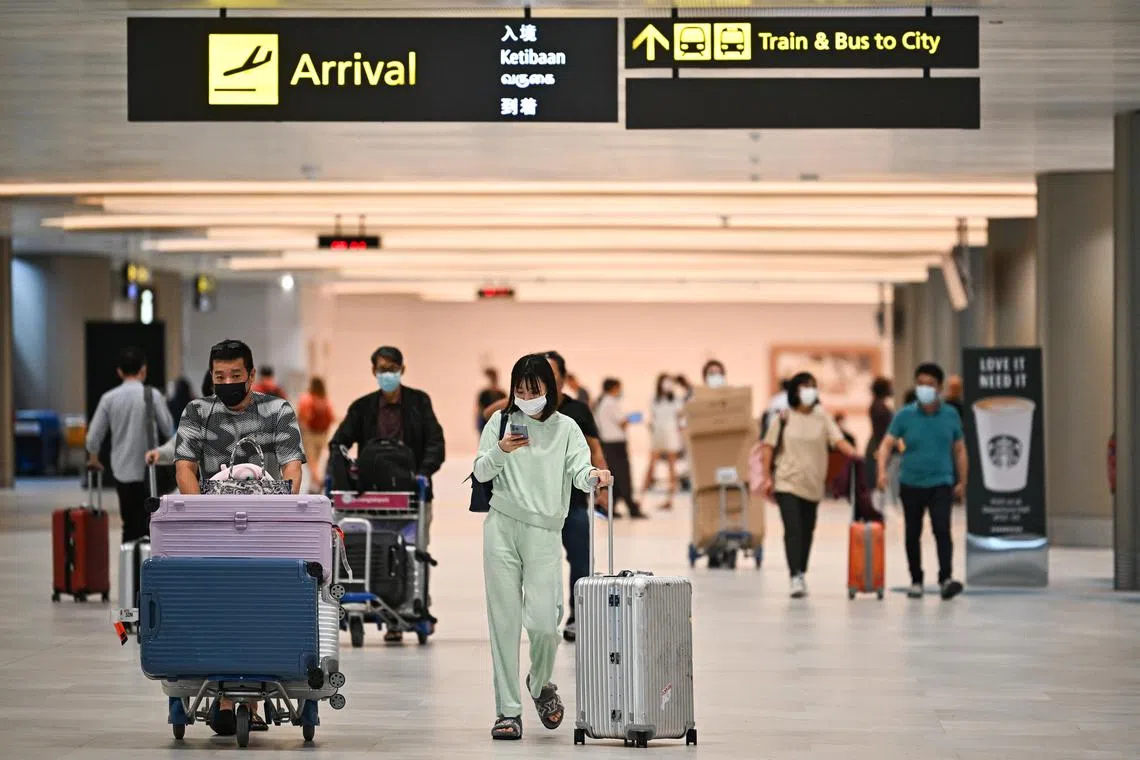Singapore to maintain ‘careful and calibrated’ approach towards restoring air connectivity with China: Iswaran
Sign up now: Get ST's newsletters delivered to your inbox

There are now 38 weekly flights between China and Singapore, including two recently approved flights to Beijing.
PHOTO: ST FILE
Follow topic:
SINGAPORE – Singapore will continue to maintain a “careful and calibrated” approach towards reopening its borders and restoring air connectivity with China, even as airlines from both sides have applied to operate more flights between the two countries.
Transport Minister S. Iswaran told Parliament on Monday that the Civil Aviation Authority of Singapore (CAAS) is evaluating these applications, and will progressively approve them.
But as with other countries previously, this will be done while considering the prevailing public health assessment, Changi Airport’s capacity and its ability to ensure efficient operations.
This approach is being taken despite there being significant scope to restore air connectivity between China and Singapore, with the number of flights and volume of passengers between the two countries currently at less than 10 per cent of pre-Covid-19 levels, Mr Iswaran noted.
“All indications are that there will be strong demand… But in the near term, if you ask me, will there be a surge? I think unlikely. But neither will we be at a standstill,” he said.
“Our desire is really to do this in a systematic, calibrated manner,” he added, declining to provide a timeline of when passenger volumes between both countries are likely to return to pre-pandemic levels when asked by Ms Ng Ling Ling (Ang Mo Kio GRC).
Mr Iswaran said there were 25 weekly flights between China and Singapore as at end-October 2022. There are now 38 weekly flights between China and Singapore, including two recently approved flights to Beijing, which works out to an average of five to six flights per day at Changi Airport.
This is less than 10 per cent of the flights that were operated between Singapore and China pre-Covid-19, and about 1.5 per cent of the total flights handled by Changi today.
Similarly, Singapore currently receives between 700 and 1,000 inbound passengers from China daily, which is about 1 per cent to 1.5 per cent of the total daily arrivals at Changi currently.
Mr Iswaran noted that more than 60 per cent of travellers arriving from China are Singapore citizens, permanent residents and long-term pass holders.
“As China reopens its borders, we will continue with this cautious approach to ensure that Changi Airport has the capacity to manage the ramp-up in flights, provide clarity and certainty to airlines, and ensure that passengers have a safe and smooth experience,” he said. “Singapore enjoys longstanding and multi-faceted relations with China. It is in the interest of both our countries to restore our air connectivity in a safe and orderly manner.”
Mr Melvin Yong (Radin Mas) asked whether the Transport Ministry had any plans to temporarily enhance Covid-19 measures at the airport given the worsening coronavirus situation in China.
In response, Mr Iswaran said that personal protective equipment (PPE) requirements have been stepped up for all airport workers performing passenger-facing and janitorial duties, in the light of the recent rise in Covid-19 cases globally.
Since Jan 3, those working in the public areas of airport terminals who interact with arriving passengers are required to wear surgical masks, CAAS said.
Similarly, those cleaning toilets in public areas now have to wear surgical masks and gloves.
These PPE requirements previously applied only to those working in transit areas.
CAAS director for corporate development and emergency preparedness Peter Wee said about 35,000 airport workers have been affected by this change, depending on their scope of work.
Mr Iswaran told Parliament that there is also a newly established facility at the Raffles Medical Group clinic at Changi Airport Terminal 3 for airport workers to get vaccinated. Almost all workers at the airport have attained the minimum protection of at least three doses of the Pfizer-BioNTech, Moderna or Novavax vaccine, or four doses of Sinovac-CoronaVac jab, he said. About half have up-to-date protection.
Mr Yong also asked if Singapore would consider requiring masks to be worn on all flights entering Singapore to reduce the risk of in-flight contamination, and act as a first line of defence against the spread of the virus.
In response, Mr Iswaran said mask-wearing is already a requirement for crew on flights from China, and China also requires mask-wearing on flights entering and leaving the country.
“Our general posture on mask-wearing is really for compliance with the source country’s or destination country’s requirement. So if you are going to a country that requires the wearing of masks while in-flight, then the airline will advise you to do so,” he added.
“In general, we have aligned our mask-wearing protocols with the protocols we have worked out with MOH (Ministry of Health) for the domestic setting, and that continues to be the way we will operate, unless there are material reasons for us to make a deviation or exception,” he said.


